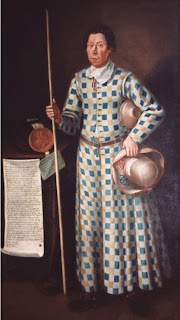Tomfoolery and the Men of the Oaks
By C. A. Asbrey
Have you ever wondered where we get the term 'John Doe', why we call silliness, 'tomfoolery', or why Murphy has his own law? I certainly have. They are all examples of either placeholder words, or Eponyms—words used to indicate a concept or thing. When a placeholder word can be a general nonsense word, such as 'thingy', 'widget', or (my favourite Scottish version) 'cardumflement', the word is meant to informally take the place of a real word. Many sink into the lexicon of families, becoming their own jargon, and everyone knows what granny is asking for when she reaches out a hand and asks for the 'whatsit', 'kadigan', or 'thingumajig.' The context provides the meaning.
Sometimes the word is simply lost in a moment of concentrating on something else, and the placeholder name is just beyond the reach of the speaker's memory. At other times they are used to assign a generality to a universal truth, or to avoid stigmatisation. In at least one case, they did more than prevent victimisation—it helped provide legal redress.
 |
| Tom Fool's Tree in Front of Muncaster Castle |
Tomfoolery is based on real people. Since the Middle ages 'Tom Fole' was a name assigned to those who were supposed to be of little intelligence. Tom was a common name, so it was an everyman kind of designation. In the lower case, it was an insult. When capitalised, it was a stock character in every pageant, play, or entertainment—Tom Fool was a clown, a jester, or a buffoon.
Tomfoolery became the word for general silliness.There is evidence that women were also performing this role too. Joculators appeared in documents from the eleventh century, and a Jocultrix called Adeline is recorded as owning land in 1086 in Hampshire. Roland Le Pettour was gifted thirty acres of land by King Henry II in the twelfth century on the provision that he return to court every Christmas day to, 'leap, whistle, and fart.' It's worth understanding that the jester only performed a couple of times a year at most, as regular appearances ate up material. The rest of the time they were trusted family servants and used that time to observe and perfect their act for special occassions.
Rich people often had their own jester, and it was a dangerous role. Meant to entertain the king, the jester often spoke the truths nobody else dared to utter. Comedy without edge was dull. Too edgy, and a comedian could be laughing all the way to the gallows. Jesters were also the people chosen to deliver dangerous messages at times of war. The term, 'shoot the messenger is now figurative, but it used to be literal. It wasn't unknown for the messenger to be sent back to his own side by the use of a trebuchet, and sometimes it was simply the messenger's severed head.
 |
| Thomas Skelton |
By the middle ages the professional fool was quick-witted, educated, and astute. He no longer dressed as a clown, and wore normal clothes. He had the ear of the king, or local nobleman, and therefore was a dangerous enemy if slighted. One such dangerous jester was Thomas Skelton, who was said to have inspired Shakespeare's Joker in King Lear. He was the last professional jester at Muncaster Castle, the stronghold of the powerful Pennington family.
When a stranger passed by the castle, Thomas was notorious for judging people quickly, and the capricious man didn't hesitate to send those he didn't like on a 'fool's errand'. He would send them off to the marshlands and quicksands where they'd meet their deaths. If he did like them, he'd point out the genuine road. He is also infamous for conspiring with the rival in love for the hand of one of the Pennington daughters to have a local carpenter beheaded for daring to form a relationship with Helwise Pennington.
Thomas Skelton died around 1600, and his ghost is said to still haunt the castle to this day.
And what about 'John Doe'? The origins go back into legal history, used less as a way to name an unknown, but more as a way for the plaintiff to remain anonymous and beyond the reach of a powerful man accused of wrong-doing. It was a legal instrument in use since the twelfth century at least. The name could also be a placeholder for a group of people as part of a class action. 'John' obviously reflects the everyman aspect once more, but the 'Doe' is a giveaway to the Norman origins. There are various ancient versions recorded in court cases: John D'Oakes (John of the Oaks), John-a-Stiles (John of the Stiles), John Roe (reflecting roe deer, more than the general Norman surname of Le Rous, meaning redhead, and John Noakes (again pertaining to someone who lived amongst the oaks). All these cases have one thing in common; the plaintiff appears to live in modest circumstances.
device by which these cases could be heard by the lower courts, and therefore resolved more quickly. An obscure legal dodge developed whereby many John Does and Richard Roes claimed to have leased land from another party, and that party turned out to be themselves under another legal alias. These vicarious claims could be compounded by multiple layers of aliases, and as the original lessor had to be given a chance to defend the action, it made it much harder to get to the bottom of a property dispute. These medieval devices became obsolete by the Real Property Limitation Act of 1833, and by the 1850s the terms had fallen out of use in the UK, other than a 'John Doe' injunction. J.K. Rowling used this legal device to prevent an unnamed person selling stolen chapters from an unpublished book.

In the USA 'John Doe' continued to be used, mainly for the placeholder name for an unidentified person or body. There are many variants, the commonest being the female version of 'Jane Doe'. There have been cases where a plaintiff has been anonymised for their own protection, the most famous being Roe vs Wade.
I mentioned 'Murphy's law', and this is actually a very recent addition to our lexicon, and it's also based on a real man. Edward A. Murphy was an American aerospace engineer who worked on safety critical systems. The man himself reputedly said the real version was, "If there's more than one way to do a job, and one of those ways will result in disaster, then he will do it that way." Murphy regarded the more popular version of the saying as "ridiculous, trivial and erroneous". The phrase, "If anything can go wrong, it will go wrong" entered the public consciousness in 1952 when a colleague mentioned 'Murphy's Law' in a press interview.

There are far too many examples to cover in a blog post. I'm sure most of you know that the Oscar is named after somebody called Oscar. Which Oscar is up for dispute. Some say it was named after Bette Davis' Husband, Harmon Oscar Nelson. Another version tells us that Margaret Herrick, an executive director in the Academy named it as it reminded her of her "
Uncle Oscar", a nickname for her cousin Oscar Pierce. I'm also sure many think that the Caesarian Section is named after Julius Caesar. The operation is very ancient. Until recently, women died during this procedure, so it was only carried out in the most desperate circumstances. However, Julius Caesar himself couldn't been born by this method as his mother lived to the age of sixty-six, and died ten years before her son. Roman law dictated that a caesarian should only be carried out when the woman was already dead. The caesarian was not named after Julius Caesar. He was named after the Latin verb caedere, meaning '
to cut'—as was the caesarian.
 |
| Charles C. Boycott |
I'm sure you'll all be aware of the campaign of mass avoidance that brought down English land agent Charles Cunningham Boycott in Ireland. It coined the term now recognised for isolating people. Nicholas Chauvin, was so stubbornly loyal to Napoleon that 'chavinsim' became a byword for unthinking bias. Elbridge Gerry's proposal to change with voting boundaries in the eighteenth century caused the Boston Gazette to coin the term 'gerrymandering'. The Miranda rights in the USA—also known as the right to remain silent—is named after a criminal called Ernesto A. Miranda. He had his conviction overturned after the supreme court decided he had not been properly warned of his rights. You may be interested to know that the right against self-incrimination came from the abolition of the adversarial cross-examinations carried out by the English Star Chamber and High Commission. The accused gained more rights from the seventeenth century onwards. However, in Scotland, where the legal system was very different, and the rights of the individual were less hierarchical. A commoner could sue a king, and the monarch was not above the law. The Scots termed the king, "first among equals", so they were expected to behave better than ordinary people. Not many did, though.
Scottish law is a mixture of many legal traditions, but the trials are adversarial. That means that it is entirely up to the accuser to prove the case, and the accused does not have to help them. Originally, sheriffs investigated cases. Procurators Fiscal were introduced in 1776 to examine evidence, investigate, and prosecute cases, even when "the parties be silent or wald utherwayis privily agree". It meant that guilt was pursued even when someone was rich enough to buy their way out (in theory, not always in practice), or when the witnesses were intimidated. The records show that the accused were cautioned that they didn't have to cooperate. William Roughhead, the Scottish lawyer and criminologist wrote, "The uneducated criminal invariably gives himself away, and even intellectual malefactors, however adroit and wary, often are tripped up by its invidious meshes. The wise say nothing." And the court was not allowed to draw an inference of guilt from that silence.
The caution used to protect the interests of the accused took a few forms, but one was recorded as: "You have heard the charge which has been read over to you. You have been brought here for the purpose of being judicially examined in relation to that charge. You are not bound to answer any questions which are put to you; but if you do answer, what you say will be written down and may be used in evidence against you at your trial."
In 1852 in Regina v William Baldry, an English judge advised that a similar form of words should have been used to protect the accused. This moved English law closer to the same protections against self-incrimination as Scotland, and most legal scholars accept that English law continued to influence American law well into the twentieth century. Even today, the Scottish system is more tilted towards protecting the rights of the individual than England or the USA—but it did contribute towards your Miranda rights.
As a footnote, just because I think you'll enjoy it: in 1985, two brothers accused of armed robbery discovered that the Norman right of 'Trial by Combat', had never been formally abolished in Scotland, and pressed for their right to fight the fifty-four year old Lord Advocate to prove their innocence. It was last done in 1597 The judiciary wisely declined this offer on the basis of the practice having fallen out of use, and supreme common sense.
Excerpt
A wobble on the mattress jolted Sewell out of the arms of his dream-woman. He grunted and shifted under the covers, moving onto his other side. He suddenly felt a dead weight on top of him, an immobilizing, ponderous pressure which left him paralyzed and unable to move. Sewell gasped, sucking in a breath of a sweet, sickly miasma which filled his lungs as he took short pants of fear. His eyelids opened snapped open as the horror of his immobility climbed. He was pinned beneath his bedclothes, unable to move a limb, except for the feet which flailed and floundered beneath the tangling sheets.
He tried to cry out but found his impotent screams lost in the fabric jamming his mouth. He lay, pinned to the bed, rigid and immobilized as his eyes became accustomed to the darkness and a figure loomed into view. Sewell’s heart stilled at the sight of a hideous crone looming over him, her wild white hair standing straight out from her head in a tangled mass in every direction. Her lips curled back in disdain around a mouth which appeared to be laughing, but not a sound was to be heard. The hag’s eyes were in shadow, lending her the appearance of a screaming skull floating above him. She sat on his chest, rendering him unable to scream, or even move as the smell filled his nostrils. It felt like powerful arms and legs kept him pinned down. What kind of nightmare was this?
The gorgon pressed close, so close he could feel the heat of her breath on his face. All he could do was blink and tremble, too stupefied to move. It seemed like the longest time before the blackness crept in, and his eyelids dropped closed once more. The nightmare didn’t leave, it took him; engulfing him entirely until he felt nothing.
Dawn crept in by inches, the dark transitioning from black to gray, until the low morning sunshine added a warming brightness to the scene. The shadows were as long as the sunbeams were cleansing, chasing down the retreating darkness to a mere frown until the morning smiled on another new day. The sun’s confidence grew, climbing higher in the sky, proud of the majestic light which gave life and succor to the whole planet—well, not all of it. Sewell Josephson never saw another day. That day saw him though, swinging gently by the creaking rope fixed to the newel post at the turn of the staircase on the top landing. The ligature bit into the neck below the engorged face from which a purple tongue protruded from his dead gaping mouth.
The only life in the house stared at the figure with unblinking black eyes and a twitching tail. The cat turned her head at the sound of a key in the back door. A human at last. Maybe the cook would know what do to?
.jpg)


















.png)